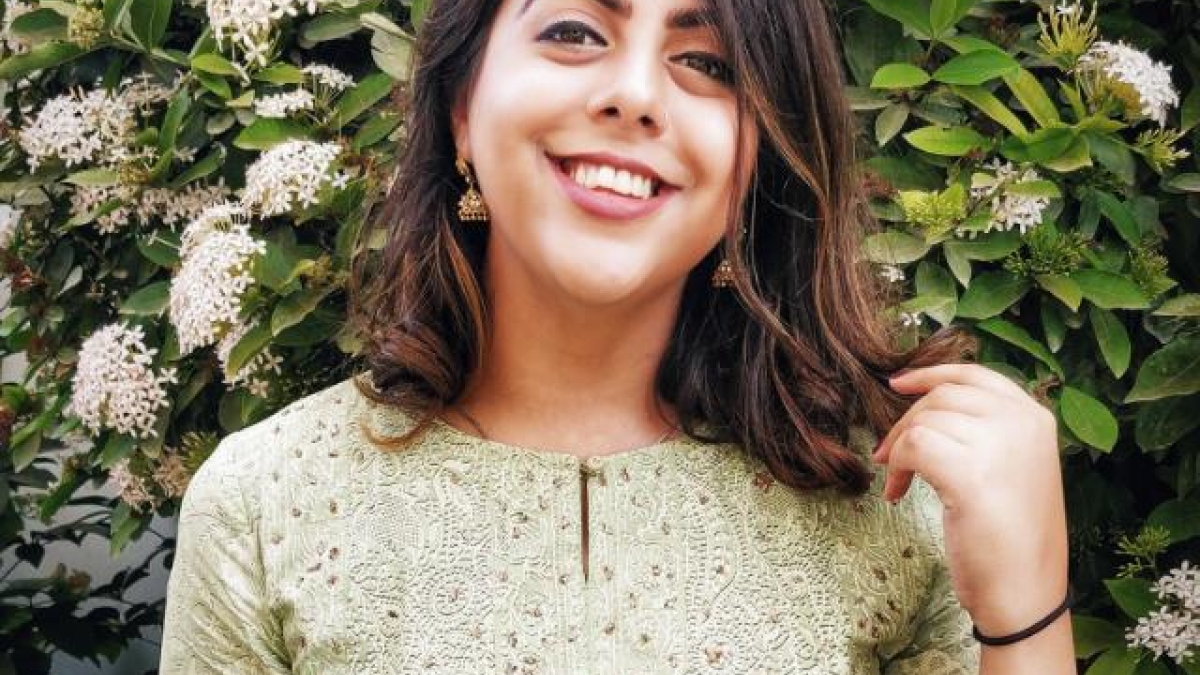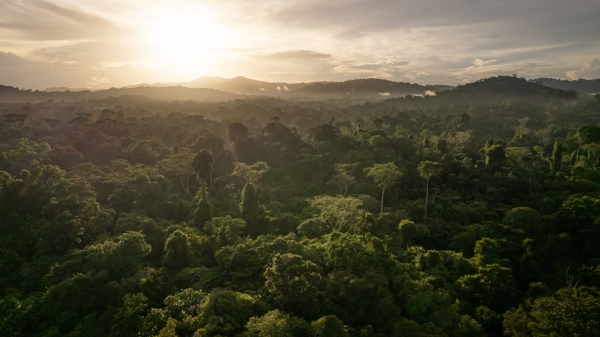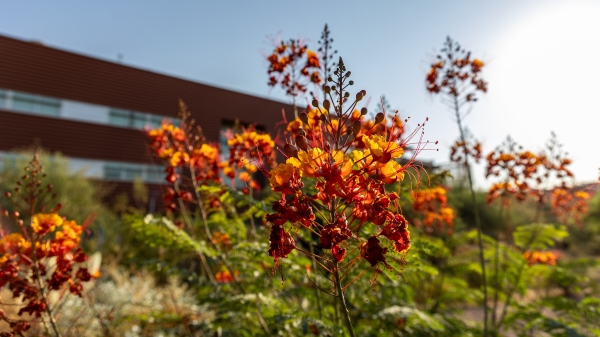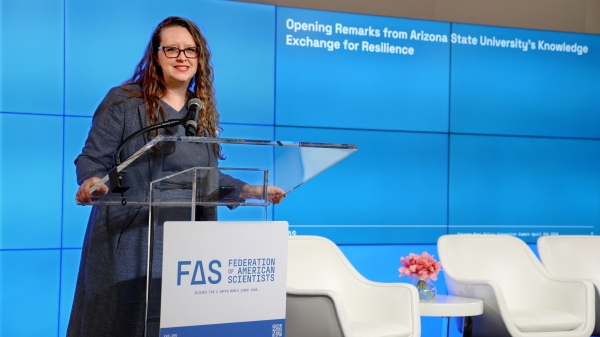ASU student’s past fuels purpose to make cities more equitable

Sana Rizwan
Sana Rizwan was 14 when she climbed into the cargo bed of an old pickup truck and was driven to the Jinnah International Airport through city streets flooded with waist-high water.
In 2007, Karachi, Pakistan, was hit with one of the worst monsoon seasons on record. Poor city planning and insufficient drainage infrastructure contributed to mass destruction and the displacement of thousands of residents within Pakistan’s southern port city.
In fleeing the city, she watched scenes of floating cars and submerged houses. People waded in water up to their torsos, while garbage and debris floated across roadways and through residential areas.
“It was the most intense flooding I had ever experienced; it felt like I was in a boat going to the airport because of how high the water was,” said Rizwan, a Master in Urban and Environmental Planning student in Arizona State University's School of Geographical Sciences and Urban Planning. “I remember then thinking how stupid it was that this great city, next to the sea with tons of riverways, had no natural drainage. How are we flooding over here?”
Rizwan, a resident of Karachi and Fulbright Scholar, has seen and experienced firsthand how communities can be marginalized by poor urban design and underinvestment in city infrastructure. She aspires to use her education to produce truly inclusive urban spaces and eliminate inequalities seen in urban communities around the world.
“Urban planning has always been about my city because most of my experiences in life have been shaped by it,” Rizwan said. “Karachi is one of the biggest cities in the world both in terms of population and also geographic size. It's tragic that it doesn’t even have a functioning mass transit system: Most roads are catered to private vehicles and there’s little to no pedestrian space. It limits opportunity and affects the dignity of life for people who can't afford cars.”
“To me, the idea of ‘the city’ is a place where I would like to not only live, but thrive.”
Due to COVID-19 travel restrictions, Rizwan has started her ASU coursework from her home in Karachi, and while she admits that it can be challenging to balance her lectures with the time zone difference, working full time, and studying in a household of 17, she isn’t discouraged. Her passion and enthusiasm for the field of urban planning shines through.
“I live and struggle with challenges regarding planning on the daily … (it) overwhelms me so much sometimes. But every time I think about washing my hands of these wicked problems, I'm just reminded about how fortunate and privileged I am to even consider not being part of a solution that could make life better and more dignified for so many,” Rizwan said. “I want there to be reciprocity in the love and care people feel for their cities.”
“I'm just all for giving it all to the cause because what else is there to live for in the short time we have here but each other?”
We asked Rizwan a few questions as she began her first semester of classes.
Question: Why did you choose ASU?
Answer: As a Fulbright Scholar, the scholarship advisory board creates these education plans for every candidate according to one’s skills and preferences for university. I received admission into three of the four universities in my plan. I got into UCLA, I got into Cornell and I got into ASU. After researching all of the universities I decided to step back and let my scholarship advisory board choose for me because all three universities were great. They helped me choose ASU.
I have to say that I was happy because it seems like a great program. It's really technical and I want to learn hard skills. I think I've got a lot of soft skills, and I'm looking for courses that are going to strengthen my technical ability. The reason I am really excited about ASU out of all the schools is that it's the one that is focused the most on innovation and technical expertise.
Question: What are you most excited to experience your first semester?
Answer: I’m really looking forward to learning. I’ve had life experiences, but I haven’t had the literature to really understand and place them with where it fits in terms of urban structure. So, I’m looking forward to just learning and listening. Also, I would love to meet new people and make friends with very similar interests. It’s really hard to find people who are interested in planning around you (laughing).
Question: What talents and skills are you bringing to the ASU community?
Answer: I think I bring perspective. I’m bringing perspective about what happens with planning oversight. Also, how average citizens are affected by the policy. I know I am pretty critical when it comes to acknowledging context. I don’t believe one strategy fits all and I believe in community participation, so I think that I am a voice that forces other people to consider other voices.
I am an activist as well. I have been part of leading the largest women’s march in Pakistan for the past three years. I am an organizer of the “Aurat March” which is a really cool movement. It brings awareness to issues that affect women and the LGBT community and other marginalized genders and minorities. We bring these issues to the government in a way that forces others to listen to us and pay attention. It’s very controversial because we face many threats but it’s also one of the coolest things to happen in the recent past over here regarding gender justice.
Question: What do you hope to accomplish during your time here at ASU?
Answer: I hope to have a rich learning experience, lots of friends, especially friends from different places. I hope to make friends from people who lived outside of Arizona, just because I want to stay at everyone’s houses and eat their home-cooked meals and see what other cities have to offer. I really like camping. I’m an adventurous person. I think it’s just beautiful to have friends from all over the world and all over the place. I also hope my dissertation is amazing and I have some meaningful impact on someone apart from my adviser and me, and I hope I am able to implement it in real life.
Question: What’s one interesting fact about yourself that only your friends know?
Answer: I think you maybe you suffered through this already, but my friends do call me Scheherazade — the character from One Thousand and One Nights — because I have a tendency to start with a story and just go on and on, onto 50 different tangents until I finally get to the point, where everyone’s looking at me wondering where this story is going and where is the end to this.
Question: If someone gave you $40 million to solve one problem in our world, what would you choose?
Answer: I think I would bribe my way into a high-level security cabinet seat where I can affect policy because I do think data is everything. I think I need to buy my way into Google or Facebook and try to make it less evil somehow.
More Environment and sustainability

Study: Conservation actions highly effective at halting, reversing biodiversity loss
A new study, led and contributed to by Arizona State University faculty, provides the strongest evidence to date that not only is…

Barrett Honors College to host nature walks for science, relaxation
Barrett, The Honors College at Arizona State University is gearing up to participate in the City Nature Challenge (CNC) for the…

Arizona adapting to heat crisis with initiatives featured in ASU report
Arizona State University's Knowledge Exchange for Resilience, also known as KER, released its Recommendations Report on Extreme…